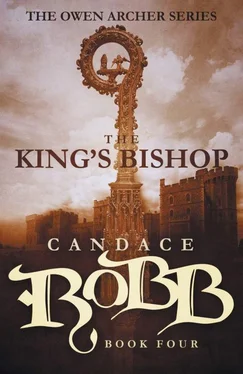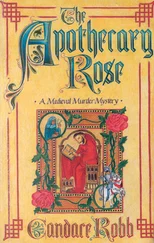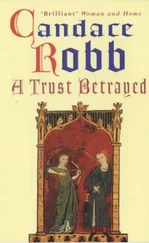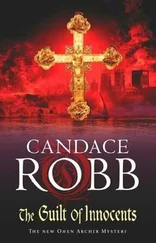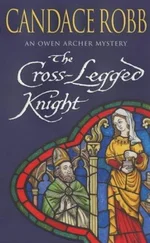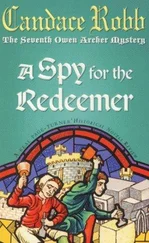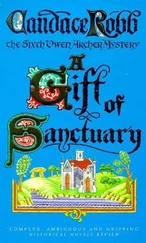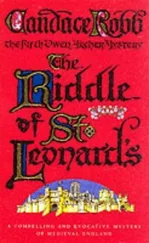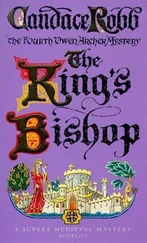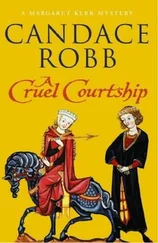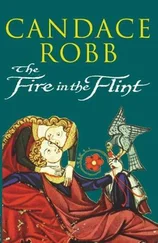Owen turned back to the iron-crossed sky. “His men have sworn he knew nothing of their effort to protect him.”
“He does not deserve her. She is a brave, elegant lady,” Ned said, sounding wistful.
“Mistress Perrers?”
“Aye. Have you ever seen such courage?”
The dreamy look in Ned’s eyes cheered Owen a little. It was more like the Ned he had known as an archer. “You said you no longer thought of women.”
Ned shrugged. “She liked you. ’Twas plain in those cat eyes of hers.”
“No doubt she would have looked kindly on anyone come to rescue her.”
“You deny it for Lucie’s sake?”
Owen laughed. “Will you write from exile to tell her?”
A rap on the door. “Message for Captain Archer,” the guard called out.
“Important man, you are, my friend.”
Owen opened the door.
“Sir William of Wykeham asks that you come right away, Captain. He found Bardolph dead in his cell.”
“Murdered?” Owen asked.
“The messenger did not say.”
Ned crossed himself. “Some hasten their own end, fearing the axe.”
Owen shook his head. “In Bardolph’s case I very much doubt it. He was worried for his soul. I doubt he would take his own life.”
“Crofter?”
“I am sure of it. Those cold eyes. Let us pray it was less painful than what the King planned.”
“I cannot share your concern for his comfort.”
Bardolph’s body had been moved to a room with more light. Wykeham greeted Owen, beckoned him over to the table where Bardolph lay. “I doubt he died unaided, Captain Archer. But I find no marks about him.”
“Poison?”
Wykeham shrugged. “I have no training in such things. But as your wife is a master apothecary and you have studied the craft, I hoped you might tell.”
“Only in the case of some poisons is there aught to see, Sir William. And only a foolish man uses such poisons, or a man who need not worry about being punished. But Bardolph’s behaviour and appearance before he died might tell us something.”
“His comrade said he was sweating and wakeful.”
“Do you trust Crofter?”
Wykeham grimaced. “He seems too calm about the death of his comrade.”
Owen nodded, turned to look Wykeham in the eye. “The King’s surgeon might be more knowledgeable in this.”
Wykeham dropped his eyes to his folded hands. “We wish to keep this matter as quiet as possible, Captain.”
Adam poured wine for three, set the flagon in front of Thoresby, and departed. Thoresby nodded to Owen and Wykeham, who lifted their mazers. “May God grant an end to this plague of murders with Crofter’s death at dawn,” Thoresby said, “though he be guilty only of poor judgement in his loyalty.” The three drank.
Owen put the mazer down before his thirst was quenched. It was after compline and he must yet tell the chancellor and the councillor what he had learned in an exhausting day of poking and prodding guards and comrades of Bardolph and Crofter. He must stay awake.
“Shall we ever know the truth of it, Captain?” Wykeham asked.
Owen glanced up at the councillor to see whether he meant the question in jest; surely he understood by now that the truth was not meant to be known. But the heavy-lidded eyes held no guile. “Crofter has ceased to speak to anyone. Neither he nor Bardolph shared confidences with their other comrades, or if they did they frightened them into silence. I did learn this: Crofter’s wife has received the deed for a sizeable property in the fens to hold for her eldest son’s maturity, property that formerly belonged to the Wyndesore family. It is said that Wyndesore did not wish the family to suffer for Crofter’s sins.”
“He did not wish Crofter to reveal his orders before he died, more like.” Thoresby said, his disgust apparent in his voice.
Owen wondered when Thoresby had aged so. His lids crinkled over his deep-set eyes, he had jowls, though his face had little flesh elsewhere.
Wykeham seemed quite young in contrast. His face was unlined, his eyes were clear and earnest. “And Bardolph’s family? Has Wyndesore provided for them?”
“He had none.”
“Ah.” Wykeham sat back in his seat, frowning slightly.
Thoresby nodded. “He could not be bought, who had no heirs.”
“What did you learn from the guards about Bardolph’s condition in his last days?” Wykeham asked.
Owen allowed himself another sip of wine. “They describe him as by turns quiet and frantic, wrapped in blankets with chills and then suddenly throwing them off and crying that he could not breathe, the air was too heavy. I am unsure what he was being fed, but I’ve little doubt he was receiving or had received a slow poison. I witnessed the sweating, thought it fear.”
“A poison administered by Crofter?” Thoresby asked.
“That is my guess, but we’ll never know for certain. As I said, Crofter is suddenly dumb.”
“You searched Crofter and the room?” Wykeham asked.
“I did.”
“And?”
“I found nothing. Of course.”
“But you thought he had been ill with fear.”
“But now he’s dead. And the men had been travelling with Don Paulus, who is known in some quarters as a herbalist who asks no questions. It is curious that the friar survived his journey with Crofter and Bardolph. Others were not so fortunate.”
“Have they found Don Paulus?” Wykeham asked.
“No.”
“They must continue to search.”
“To what end?” Thoresby demanded, pressing the bridge of his nose, his eyes closed. “He will not speak. Why should he? What would he gain?”
“We must know whether Crofter poisoned Bardolph,” Wykeham insisted.
“For Heaven’s sake, give it up!” Thoresby cried. “No one wishes to know that but you. Bardolph would have been dead come morning. What does it matter if the man who was to die with him hastened the end for him? How would we know whether it was out of fear of exposure or charity? Eh? Speculation. All speculation. We have no proof. We shall never have any proof.” Thoresby nodded to Owen. “You look weary to the bone. I shall keep you no longer.”
“Weary I am,” Owen said, rising. He wondered at the Archbishop’s outburst, but not so much that he wished to linger.
After Owen had taken his leave, Thoresby refilled his mazer, passed the flagon to Wykeham. “You must pardon my temper. It comes of frustration.” He shook his head as Wykeham began to reply. “The King has commanded me to cease my probing. He wishes for some peace. He will hear no more of this.”
“Because of Prince Edward’s illness?”
“Aye. The Queen is concerned by Lancaster’s report that the Prince cannot rise from his bed, though the Prince himself sends word that he is well, recovering as quickly as ever.”
“It is fortunate that Lancaster is with his brother so we may know the truth.”
“Fortunate? To frighten the Queen when she is herself so ill?” Had Thoresby been Phillippa’s son, he would have kept the worry from her. But he did not care to discuss the Queen with Wykeham. “I understand you volunteered to be confessor to the condemned men, Sir William.”
Wykeham sat with flagon in hand, one finger tracing the intricate silverwork on the lid. Eyes still on the flagon, he said quietly, “I beg you to forgive my accusation that you meant to trick me out of the chancellor’s chain. I feel ill tonight, thinking of six lives lost for an ageing King’s vanity and a soldier’s plotting.” Slowly, as if fearful it would shatter, Wykeham rested the flagon on the table. He lifted his mazer, raised his eyes to Thoresby. “You came to me in friendship and I mistrusted you. May God bless you, my Lord Chancellor, and forgive me for my ignorance.”
Читать дальше
